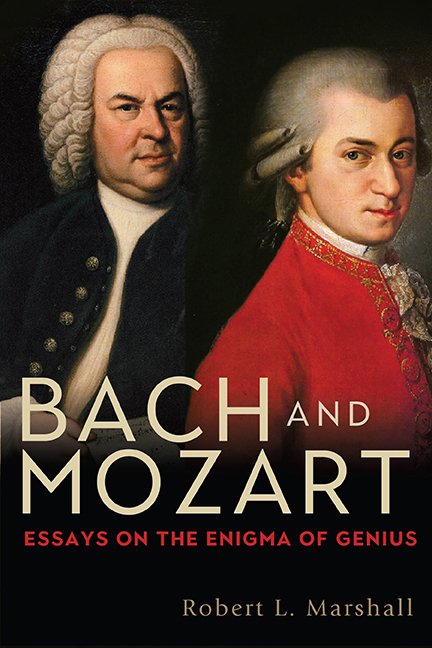Book contents
- Frontmatter
- Dedication
- Epigraph
- Contents
- List of Figures
- Preface
- List of Abbreviations
- Prologue. The Century of Bach and Mozart as a Music-Historical Epoch: A Different Argument for the Proposition
- 1 Young Man Bach: Toward a Twenty-First-Century Bach Biography
- 2 The Notebooks for Wilhelm Friedemann and Anna Magdalena Bach: Some Biographical Lessons
- 3 Bach and Luther
- 4 Redeeming the St. John Passion–and J. S. Bach
- 5 Bach's Keyboard Music
- 6 The Minimalist and Traditionalist Approaches to Performing Bach's Choral Music: Some Further Thoughts
- 7 Truth and Beauty: J. S. Bach at the Crossroads of Cultural History
- 8 Bach at Mid-Life: The Christmas Oratorio and the Search for New Paths
- 9 Bach at the Boundaries of Music History: Preliminary Reflections on the B-Minor Mass and the Late-Style Paradigm
- 10 Father and Sons: Confronting a Uniquely Daunting Paternal Legacy
- 11 Johann Christian Bach and Eros
- 12 Bach and Mozart: Styles of Musical Genius
- 13 Mozart and Amadeus
- 14 Bach and Mozart's Artistic Maturity
- 15 Mozart's Unfinished: Some Lessons of the Fragments
- Epilogue (ossia Postmortem). Had Mozart Lived Longer: Some Cautious (and Incautious) Speculations
- Notes
- Works Cited
- Index
- Miscellaneous Endmatter
- Eastman Studies in Music
13 - Mozart and Amadeus
Published online by Cambridge University Press: 29 March 2020
- Frontmatter
- Dedication
- Epigraph
- Contents
- List of Figures
- Preface
- List of Abbreviations
- Prologue. The Century of Bach and Mozart as a Music-Historical Epoch: A Different Argument for the Proposition
- 1 Young Man Bach: Toward a Twenty-First-Century Bach Biography
- 2 The Notebooks for Wilhelm Friedemann and Anna Magdalena Bach: Some Biographical Lessons
- 3 Bach and Luther
- 4 Redeeming the St. John Passion–and J. S. Bach
- 5 Bach's Keyboard Music
- 6 The Minimalist and Traditionalist Approaches to Performing Bach's Choral Music: Some Further Thoughts
- 7 Truth and Beauty: J. S. Bach at the Crossroads of Cultural History
- 8 Bach at Mid-Life: The Christmas Oratorio and the Search for New Paths
- 9 Bach at the Boundaries of Music History: Preliminary Reflections on the B-Minor Mass and the Late-Style Paradigm
- 10 Father and Sons: Confronting a Uniquely Daunting Paternal Legacy
- 11 Johann Christian Bach and Eros
- 12 Bach and Mozart: Styles of Musical Genius
- 13 Mozart and Amadeus
- 14 Bach and Mozart's Artistic Maturity
- 15 Mozart's Unfinished: Some Lessons of the Fragments
- Epilogue (ossia Postmortem). Had Mozart Lived Longer: Some Cautious (and Incautious) Speculations
- Notes
- Works Cited
- Index
- Miscellaneous Endmatter
- Eastman Studies in Music
Summary
During the annual meeting of the American Musicological Society (AMS) in the year 1996, the society sponsored a first-ever panel devoted to exploring a new dis-cipline within our discipline, namely, film as musicology (ossia: musicology as film criticism). I was asked to consider Milos Forman's cinematic version of Peter Shaffer's sensational play Amadeus. It was certainly about time for such an effort, consider-ing how many times members of our profession had been asked: “Was Mozart really like that?” or “Were there really such creatures as castrati—and were they really like that?” In short: Hollywood had discovered the romance of music history and had become infatuated with it (if not necessarily with us). But before true love could take hold with its new object of desire, Tinseltown evidently was convinced that cosmetic surgery was necessary—minor or major (no pun intended) as the case may be. But since, for the love object, the more radical the surgery, the greater the risk of disfigurement, perhaps fatally so, it would seem to have fallen to music scholars, if to anyone, to be on guard—prepared to do battle, if necessary, but not to assume that they are destined to be up against an inevitably hostile antagonist.
I suggested to my colleagues that before any of us were tempted to seek the thrilling rush of the sense of intellectual and moral superiority by bashing Hollywood for falsifying the facts of music history (and in the process perhaps risking no little embarrassment), we would do well to pause for a moment and consider: what would we think of, say, any historians of ancient history who would rake Shakespeare, or Handel, over the coals for what they had done to the historical Julius Caesar? If their gripe were solely with the undisputed circumstance that hard facts had been disre-garded, rearranged, deliberately distorted, or even completely made up, well, then, I think we might be inclined to dismiss the criticism, to put it mildly, as missing the point. The poetic license, after all, is a license, if not to kill, then at least to maim, the literal truth. Such criticism would also fail to acknowledge the manifestly differ-ent purposes of historiography and dramaturgy.
- Type
- Chapter
- Information
- Bach and MozartEssays on the Engima of Genius, pp. 197 - 211Publisher: Boydell & BrewerPrint publication year: 2019



